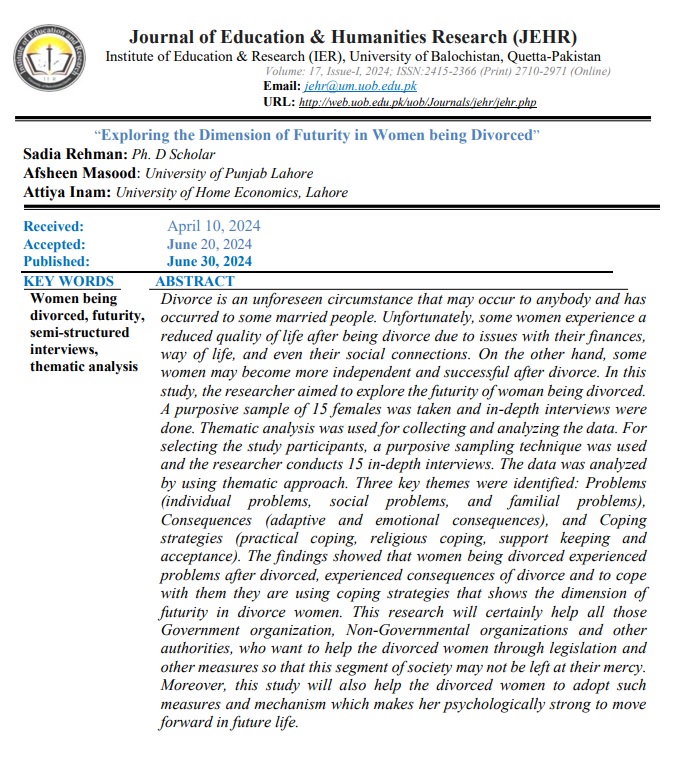Exploring the Dimension of Futurity in Women being Divorced
Keywords:
women being divorced, futurity, semi-structured interviews, thematic analysisAbstract
Divorce is an unforeseen circumstance that may occur to anybody and has occurred to some married people. Unfortunately, some women experience a reduced quality of life after being divorce due to issues with their finances, way of life, and even their social connections. On the other hand, some women may become more independent and successful after divorce. In this study, the researcher aimed to explore the futurity of woman being divorced. A purposive sample of 15 females was taken and in-depth interviews were done. Thematic analysis was used for collecting and analyzing the data. For selecting the study participants, a purposive sampling technique was used and the researcher conducts 15 in-depth interviews. The data was analyzed by using thematic approach. Three key themes were identified: Problems (individual problems, social problems, and familial problems), Consequences (adaptive and emotional consequences), and Coping strategies (practical coping, religious coping, support keeping and acceptance). The findings showed that women being divorced experienced problems after divorced, experienced consequences of divorce and to cope with them they are using coping strategies that shows the dimension of futurity in divorce women. This research will certainly help all those Government organization, Non-Governmental organizations and other authorities, who want to help the divorced women through legislation and other measures so that this segment of society may not be left at their mercy. Moreover, this study will also help the divorced women to adopt such measures and mechanism which makes her psychologically strong to move forward in future life.
References
Akhavan M. Consequences of divorce among transition of its stages. J Women's survey 2003; 1(3): 125-52.
Amato, P. R. (2014). The consequences of divorce for adults and children: Journal for General Social Issues, 23, 5–24. doi: 10.5559/di.23.1.01
Amato, P.R. and Keith, B. (1991). Parental divorce and the well-being of children: a metaanalysis. Psychological Bulletin vol 110(1) : Pp 26-46. doi: 10.1037/0033- 2909.110.1.26
Barron, L. (2010). Divorce and its effects on the development of children.
Beeble, M. L., Bybee, D., Sullivan, C. M., & Adams, A. E. (2009). Main, mediating, and moderating effects of social support on the well-being of survivors of intimate partner violence across 2 years. Journal of Consulting and Clinical Psychology, 77, 718–729.
Beisert, M. (2000). Rozwód. Proces zmagania się zkry-zysem [Divorce. The process of confronting crisis]. Poznań: Wydawnictwo Fundacji Humaniora.
Błażek, M. (2014). Rozwod jako sytuacja kryzysowa w rodzinie [Divorce as a crisis situation in a family]. Psychologia rodziny, 459-481.
Demo, D. H., & Fine, M. A. (2010). Beyond the average divorce. Sage.
Greeff, A. P., & Van Der Merwe, S. (2004). Variables associated with resilience in divorced families. Social indicators research, 68, 59-75.
Gaffal, M., & Gaffal, M. (2010). Factors influencing ex-spouses’ adjustment to divorce. Psychosocial and Legal Perspectives of Marital Breakdown: With Special Emphasis on Spain, 47-81.
Hawkins, D. N., & Booth, A. (2005). Unhappily ever after: Effects of long-term, low- quality marriages on well-being. Social Forces, 84(1), 451-471.
Karela, C., & Petrogiannis, K. (2018). Risk and resilience factors of divorce and young Children’s emotional well-being in Greece: a correlational study. Journal of Educational and Developmental Psychology, 8(2), 2.
King, V. (2003). The legacy of a grandparent's divorce: Consequences for ties between grandparents and grandchildren. Journal of Marriage and Family, 65(1), 170-183.
Lawson, E., & Thompson, A. (1999). Black men and divorce. Thousand Oaks, CA: Sage.
Nathanson, I. G. (1995). Divorce and women's spirituality. Journal of divorce & remarriage, 22(3-4), 179-188.
Pargament, K. I., Ensing, D. S., Falgout, K., Olsen, H., Reilly, B., Van Haitsma, K., & Warren, R. (1990). God help me: Religious coping efforts as predictors of the outcomes to significant negative life events. Journal of Community Psychology, 18, 793–824.
Rastogi, M. (2009). Drawing gender to the foreground: Couple therapy with South Asians in the United States. In M. Rastogi & T. Volker (Eds.), Multicultural couple therapy (pp. 345–370). Thousand Oaks, CA: Sage.
Richmond, L. S., & Christensen, D. H. (2001). Coping strategies and post-divorce health outcomes. Journal of Divorce & Remarriage, 34(1–2), 41–59.
Walsh, F. (2002). A family resilience framework: Innovative practice applications. Family Relations, 51, 130–137.
Yárnoz-Yaben, S. (2015). Forgiveness, adjustment to divorce and support from the former spouse in Spain. Journal of Child and Family Studies, 24, 289-297.




